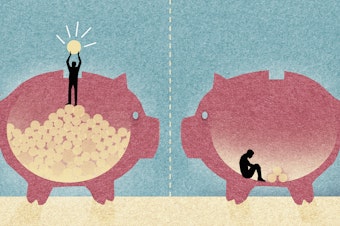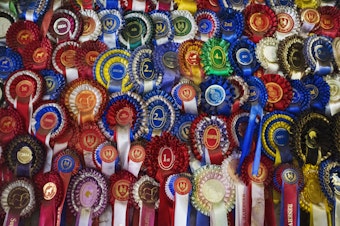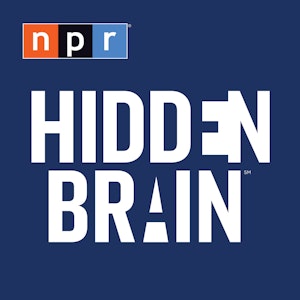Shankar Vedantam
Podcasts
Stories
-

Why No One Feels Rich: The Psychology Of Inequality
If you've ever flown in economy class on a plane, you probably had to walk through the first class cabin to get to your seat. Maybe you noticed the extra leg room. The freshly-poured champagne. Maybe you were annoyed, or envious. Social psychologist Keith Payne says we tend to compare ourselves with those who have more than us, but rarely with those who have less. This week, we explore the psychology of income inequality, and how perceptions of our own wealth shape our lives.
-

What Can A Personality Test Tell Us About Who We Are?
The desire to find our tribe is universal. We like to know who we are and where we belong. This fascination has led to a thriving industry built on the marketing and sale of personality tests. These tests offer individuals – and, increasingly, employers – quick and easy insights that can be used to make some of life's biggest decisions. But most fail to stand up to scientific scrutiny. This week, we revisit our 2017 episode about the world of personality testing, and explore the many different ways we assess personality and potential – from the Chinese zodiac to Harry Potter houses to the Myers-Briggs test.
-

Radically Normal: How Gay Rights Activists Changed The Minds Of Their Opponents
For generations, living openly as a gay person in the United States was difficult, and often dangerous. But there's been a dramatic change in public attitudes toward gay people. This week, we explore one of the most striking transformations of public attitude ever recorded. And we consider whether the strategies used by gay rights activists hold lessons for other groups seeking change.
-

Don't Panic: Stories Of Coping Amidst Chaos
Chaos is a part of all of our lives. Sometimes we try to control it. And other times, we just have to live with it. On this week's Hidden Brain, we bring you two of our favorite stories about coping with chaos. They come from our 2016 episodes "Panic in the Streets" and "Embrace the Chaos."
-

What Twins Can Tell Us About Who We Are
In December 1988, two pairs of twin boys were born in Colombia. One twin from each pair was accidentally given to the wrong mother — a mistake that wasn't discovered for decades. The twins' story is a tragedy, a soap opera, and a science experiment, all rolled into one. It also gives us clues about the role that genes and the environment play in shaping our identities. We talk with psychologist Nancy Segal about her work with twins, and her encounters with these now-famous brothers. For research related to this episode, please visit https://n.pr/2uvpvPe
-

Never Go To Vegas
All social classes have unspoken rules. From A-list celebrities to teachers, doctors, lawyers, and journalists — there are social norms that govern us, whether we realize it or not. This week on Hidden Brain, we look celebrity culture, as well as another elite group: the yoga-loving, Whole Foods-shopping, highly-educated people whom one researcher calls the new "aspirational class." This episode is from December 2017.
-

Love, Sex, And Robots
From stone statues to silicone works of art, we have long sought solace and sex from inanimate objects. Time and technology have perfected the artificial lover: today we have life-size silicone love dolls so finely crafted they feel like works of art. Now, with the help of robotics and artificial intelligence, these dolls are becoming even more like humans. This week we talk with researcher Kate Devlin about the history of the artificial lover, and consider what love and sex look like in the age of robots.
-
Why Partisanship Changes How People React To Noncontroversial Statements
New research finds that partisans agree with bumper sticker slogans — unless they are told that those slogans were made by a leader of the opposing party.
-

For Sale, By Owner: The Psychology Of Repugnant Transactions
You own your body. So should you be able to sell parts of it? This week, we explore the concept of "repugnant transactions" with the man who coined the term, Nobel Prize- winning economist Al Roth. He says repugnant transactions can range from selling organs to poorly-planned gift exchanges — and what's repugnant in one place and time is often not repugnant in another.
-

Better Than Cash: How Awards Can Shape Our Behavior
Our modern world is saturated with awards. From elementary school classrooms to Hollywood to the hallways of academia, there's no shortage of prizes — and people who covet them. Yet we rarely stop to ask, do they work? We pose that question to economist Bruno Frey, who argues that awards can have a powerful, positive effect on our behavior — but only if they're designed well.
